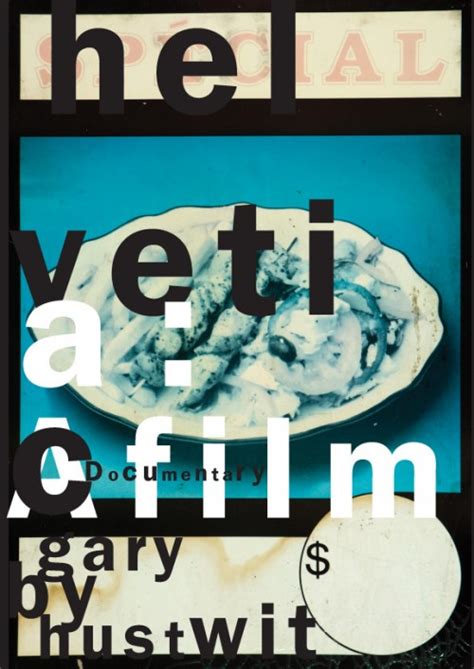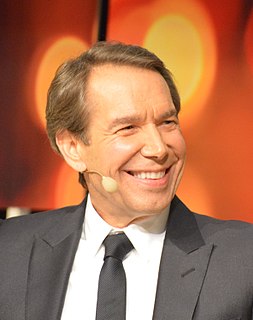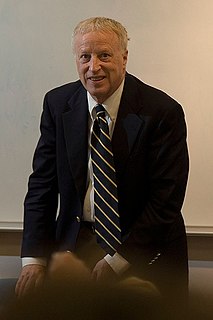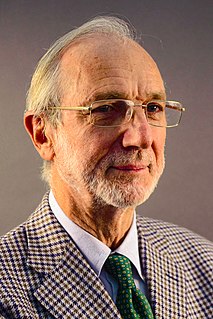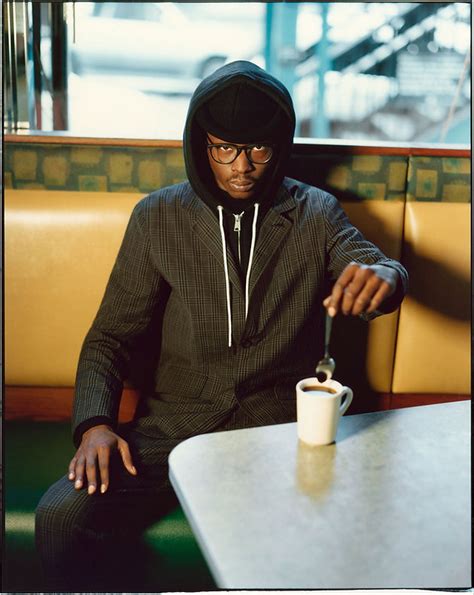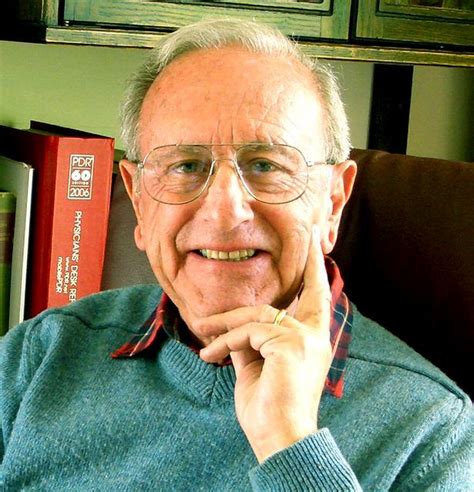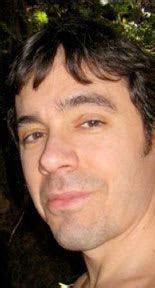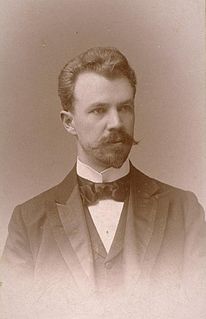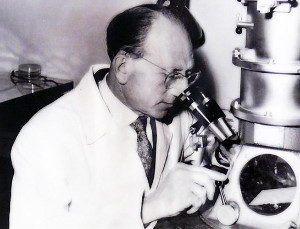Top 192 Sociology Quotes & Sayings - Page 3
Explore popular Sociology quotes.
Last updated on December 21, 2024.
I moved to Philadelphia to go to school at Eastern partly because I wanted to study the Bible and I also went to study sociology. I like how Karl Barth said we have to read the Bible in one hand and the newspaper in the other so that our faith doesn't just become a ticket into heaven and a license to ignore the world around us.
I had the good fortune to be able to take a course with Margaret Mead. I had a fabulous art course, where it was explained to me that nothing exists in a vacuum, that everything is a result of the period in which it's done - the economics, the sociology, the politics, all sewn together. That was a very important lesson.
If you know anything about Islamic civilization, or about the contemporary Middle East, about the sociology and the anthropology of the people who live there, and their recent history, and their religion, and their motivation and everything, then you realize that changing Iraq into a democracy is not going to happen. It's just not going to happen.
Although, from the point of view of sociology, the overt ambition of 'American Pastoral' - to imagine the impact on a good man of America's fall from the family decencies of the '30s and '40s to the self-centred violence of the '60s - outstrips anything Sabbath's Theater attempts, the writing is no less fervid an excurse into the writer's mind.
My major preoccupation is the question, 'What is reality ?' Many of my stories and novels deal with psychotic states or drug-induced states by which I can present the concept of a multiverse rather than a universe. Music and sociology are themes in my novels, also radical political trends; in particular I've written about fascism and my fear of it.
And on this issue of the Shia in Iraq, I think there's been a certain amount of, frankly, Terry, a kind of pop sociology in America that, you know, somehow the Shia can't get along with the Sunni and the Shia in Iraq just want to establish some kind of Islamic fundamentalist regime. There's almost no evidence of that at all. Iraq's always been very secular.
My Third-World roots remind me that the vast majority of our fellow human beings live hungry, sick, and uneducated, and that most social scientists, even in that world, ignore that ugly reality. This is why my papers in mathematical sociology deal not with free choice among 30 flavors of ice-cream, but with social structure, social cohesion, and social marginality.
A religious phenomenon will only be recognized as such if it is grasped at its own level, that is to say, if it is studied as something religious. To try to grasp the essence of such phenomenon by means of physiology, psychology, sociology, economics, linguistics, art or any other study is false; it misses the one unique and irreducible element in it - the element of the sacred.
Children have no use for psychology. They detest sociology. They still believe in God, the family, angels, devils, witches, goblins, logic, clarity, punctuation, and other such obsolete stuff. When a book is boring, they yawn openly. They don't expect their writer to redeem humanity, but leave to adults such childish allusions.
Bill Phillips was this nervous, chain-smoking student. He had signed up to be an engineer, he had gone away to fight in the Second World War, he had come back. He had switched to sociology because he wanted to understand how people could do these terrible things to each other. And he did a little bit of economics on the side.
Economic theorists, like French chefs in regard to food, have developed stylized models whose ingredients are limited by some unwritten rules. Just as traditional French cooking does not use seaweed or raw fish, so neoclassical models do not make assumptions derived from psychology, anthropology, or sociology. I disagree with any rules that limit the nature of the ingredients in economic models.
Study the behavior of animals and you will understand human psychology and sociology. Study a flower excited under sunlight, and you will understand how all living things respond to light. The Almighty has provided everything in nature. Observe nature and you will grow. The cures of all illnesses are found in nature in the shapes of the body parts they were created to cure.
I started my professional life as a philosopher of language and for several years took the orthodox line that meaning is an essentially linguistic phenomenon. Whether as a result of simply listening to everyday talk about meaning, or reading books of anthropology, sociology and art history, it dawned on me that there is nothing at all privileged or central about linguistic meaning.
As a Black woman filmmaker I feel that’s my job: visibility. And my preference within that job is Black subjectivity. Meaning I’m interested in the lives of Black folk as the subject. Not the predicate, not the tangent.[These stories] deserve to be told. Not as sociology, not as spectacle, not as a singular event that happens every so often, but regularly and purposefully as truth and as art on an ongoing basis, as do the stories of all the women you love.
The essence of totalitarian government, and perhaps the nature of every bureaucracy, is to make functionaries and mere cogs in the administrative machinery out of men, and thus to dehumanize them. And one can debate long and profitably on the rule of Nobody, which is what the political form known as bureau-cracy truly is….we have become very much accustomed by modern psychology and sociology, not to speak of modern bureaucracy, to explaining away the responsibility of the doer for his deed in terms of this or that kind of determinism.
I am a taxonomist, I work in the descriptive, narrative sciences of natural history. Unfortunately there is this status ordering from physics, the queen of the sciences up on top, down through a bunch of squishy subjects, ending up with sociology and psychology on the bottom. Palaeontologists are not much above that in their conventional ordering.
Architecture is art. I don't think you should say that too much, but it is art. I mean, architecture is many, many things. Architecture is science, is technology, is geography, is typography, is anthropology, is sociology, is art, is history. You know all this comes together. Architecture is a kind of bouillabaisse, an incredible bouillabaisse. And, by the way, architecture is also a very polluted art in the sense that it's polluted by life, and by the complexity of things.
I think that's the most important part of doing this job, is learning different personality types. I mean, it's kind of like sociology or psychology in a sense. With that, and with every project I do, I think I'm able to pull something away that further makes me understand humanity in a way I didn't before.
The first proponent of cortical memory networks on a major scale was neither a neuroscientist nor a computer scientist but .. a Viennes economist: Friedrich von Hayek (1899-1992). A man of exceptionally broad knowledge and profound insight into the operation of complex systems, Hayek applied such insight with remarkable success to economics (Nobel Prize, 1974), sociology, political science, jurisprudence, evolutionary theory, psychology, and brain science (Hayek, 1952).
Human well-being is not a random phenomenon. It depends on many factors - ranging from genetics and neurobiology to sociology and economics. But, clearly, there are scientific truths to be known about how we can flourish in this world. Wherever we can have an impact on the well-being of others, questions of morality apply.
My parents, grandmother and brother were teachers. My mother taught Latin and French and was the school librarian. My father taught geography and a popular class called Family Living, the precursor to Sociology, which he eventually taught. My grandmother was a beloved one-room school teacher at Knob School, near Sonora in Larue County, Ky.
I think sociologists are among the best at thinking about emergence, of thinking about the ways that the society is more than the sum of the individuals. And I've found that much of the wisest writing on human social nature comes from sociology and anthropology, not from my own field of social psychology.
I've got a solid grounding in history, sociology, anthropology, philosophy, etc etc. That means I actually have a good idea about how societies change and evolve. I know how a lot of them have actually functioned through the years. I can put together a culture that's cool and different, while still being logically consistent, so that it feels real. So many fantasy worlds are either implausible, cookie-cutter, or both. Mine aren't.
You don't see Los Angeles erecting a museum dedicated to the birth place of the Crips and the Bloods and the Mexican Mafia, with a special guided bus tour highlighting the rise of the crack trade, yet you can hop on a bus in Chicago tomorrow to see the famous locales of murders. I have to imagine there's some wonderful academic book on the sociology of this out there.
Oral history is a research method. It is a way of conducting long, highly detailed interviews with people about their life experiences, often in multiple interview sessions. Oral history allows the person being interviewed to use their own language to talk about events in their life and the method is used by researchers in different fields like history, anthropology and sociology.
In The Art and Aesthetics of Boxing, David Scott addresses the daunting task of establishing a groundwork for the aesthetics of boxing-and succeeds with consummate authority. . . . In Scott's incisive blend of art history, sociology, and sports writing, he makes a daring and original statement about fighters and the artists who enshrined them.
Conventions of generality and mathematical elegance may be just as much barriers to the attainment and diffusion of knowledge as may contentment with particularity and literary vagueness... It may well be that the slovenly and literary borderland between economics and sociology will be the most fruitful building ground during the years to come and that mathematical economics will remain too flawless in its perfection to be very fruitful.
Nothing is done. Everything in the world remains to be done or done over. The greatest picture is not yet painted, the greatest play isn't written, the greatest poem is unsung. There isn't in all the world a perfect railroad, nor a good government, nor a sound law. Physics, mathematics, and especially the most advanced and exact of the sciences are being fundamentally revised. . . Psychology, economics, and sociology are awaiting a Darwin, whose work in turn is awaiting an Einstein.
Living in cities is an art, and we need the vocabulary of art, of style, to describe the peculiar relationship between man and material that exists in the continual creative play of urban living. The city as we imagine it, then, soft city of illusion, myth, aspiration, and nightmare, is as real, maybe more real, than the hard city one can locate on maps in statistics, in monographs on urban sociology and demography and architecture.
For Jews, the Messiah has never come; for Christians, He has come but once; for modern man, He appears and disappears with increasing rapidity. The saviors of modern man, the "scientists" who promise salvation through the "discoveries" of ethology and sociology, psychology and psychiatry, and all the other bogus religions, issue forth periodically, as if selected by some Messiah-of-the-Month Club.
Biochemists and biologists who adhere blindly to the Darwinism theory search for results that will be in agreement with their theories and consequently orient their research in a given direction, whether it be in the field of ecology, ethology, sociology, demography (dynamics of populations), genetics (so-called evolutionary genetics), or paleontology. This intrusion of theories has unfortunate results: it deprives observations and experiments of their objectivity, makes them biased, and, moreover, creates false problems.
Cram them full of non-combustible data, chock them so damned full of 'facts' they feel stuffed, but absolutely 'brilliant' with information. Then they’ll feel they’re thinking, they’ll get a sense of motion without moving. And they’ll be happy, because facts of that sort don’t change. Don’t give them any slippery stuff like philosophy or sociology to tie things up with. That way lies melancholy.
I have learned things from the game. Much of my knowledge of locations in Britain and Europe comes not from school, but from away games or the sports pages, and hooliganism has given me both a taste for sociology and a degree of fieldwork experience. I have learned the value of investing time and emotion in things I cannot control, and of belonging to a community whose aspirations I share completely and uncritically.
The theme of corporate stories (and millions drink them in every day) seldom varies: to be happy you must consume, to be special you must conform. Absurd, obviously, yet our identities have become so fragile, so elusive, that we seem content to let advertisers provide us with their version of who we are, to let them recreate us in their image: a cookie-cutter image based on market research, shallow sociology, and insidious lies.
Here is a quilted book about mathematical practice, each patch wonderfully prepared. Part invitation to number theory, part autobiography, part sociology of mathematical training, Mathematics without Apologies brings us into contemporary mathematics as a living, active inquiry by real people. Anyone wanting a varied, cultured, and penetrating view of today's mathematics could find no better place to engage.
If you want to get together in any exclusive situation and have people love you, fine - but to hang all this desperate sociology on the idea of The Cloud-Guy who has The Big Book, who knows if you've been bad or good - and CARES about any of it - to hang it all on that, folks, is the chimpanzee part of the brain working.
If any student of social science comes to appreciate the case of the Forgotten Man, he will become an unflinching advocate of strict scientific thinking in sociology, and a hard-hearted skeptic as regards any scheme of social amelioration. He will always want to know, Who and where is the Forgotten Man in this case, who will have to pay for it all?





